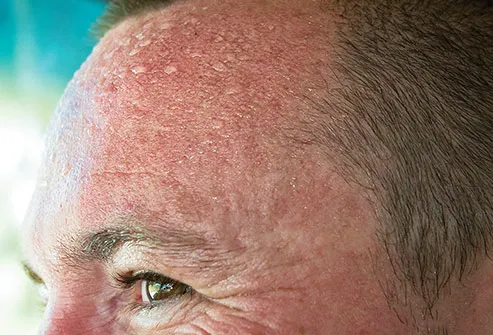Fever Flush
DeFever overview. DeFever is a classic yacht builder in the boating world. YachtWorld currently has 41 DeFever yachts for sale, including 0 new vessels and 41 used yachts, listed by experienced dealerships mainly in the following countries: United States, Spain, Malaysia, Australia and Italy. Stressful Events. If you are experiencing stress, you can have hot flashes. Stress can cause you to. Fever and Flushed skin. WebMD Symptom Checker helps you find the most common medical conditions indicated by the symptoms fever and flushed skin including Viral pharyngitis, Gastroenteritis,.
Fever vs Hot Flashes
Fever, or pyrexia, is described as an increase of body temperature as a response to a certain disease or illness. It is a common symptom of a medical condition. As the patient’s temperature increases, they may feel cold before their temperatures become stabilized or come to a halt.
Fever is not a form of disease but rather an indicator that the body is battling against an infection caused by viruses or bacteria. The rise in body temperature helps a person discover the infection. However, there are times that the body temperature may be too high that the fever may be serious enough to result in complications. But so long as the fever remains mild, there is really nothing to worry about. There is no need to put in too much effort in trying to bring the fever down. A body temperature reading beyond 39˚C, though, is no longer classified as a mild fever. If the fever remains mild, it simply indicates that the body is at work fighting the infection.
Fever is usually relieved by administering antipyretics or drugs that bring down fever. If a fever starts to be bothersome, these drugs can be given. Fevers may be caused by chicken pox, strep throat, flu, heat stroke, and alcohol withdrawal, among other things. When a person is down with a fever, he or she may feel cold, even if it is not cold at all, and he or she may shiver, lose appetite, and feel depressed. A patient may also have an increased sensitivity to pain, feel more tired than usual, and have problems with concentration.
On the other hand, hot flashes are a warm sensation that is felt all over the body which start from the head and neck area. Hot flashes are more commonly felt by women after their menopausal stage. However, not all women in their menopausal stage may experience this symptom. The decreasing estrogen levels are believed to be the cause of this particular symptom. A hot flash may also present itself as a result of taking certain medications, and sometimes it may occur with cancers or severe infections. Hot flashes are characterized by skin flushing, excessive sweating especially when sleeping.
Just like a fever, hot flashes are not a disease but a symptom. With a careful assessment of the patient’s medical history, the doctor may be able to determine whether a woman is experiencing hot flashes. Hot flashes can also be triggered by caffeine, alcohol, diet pills, spicy food, saunas, hot weather, hot rooms, and smoking. Hot flashes can be treated with bioidentical hormone therapy and other alternative treatments. The treatments may have not been proven to be effective and are also not approved by the FDA.
Summary:
- Fever is defined as an increase in body temperature as a response to a certain disease.
- Fever is an indicator of a body infection caused by viruses or bacteria, while hot flashes are experienced due to declining estrogen levels.
- Both fevers and hot flashes are not diseases but symptoms
- Fevers are relieved by antipyretics while hot flashes can be relieved by using hormonal therapy or other alternative treatments.
- Hot flashes are usually experienced by menopausal women, while a fever is experienced by anyone who may have an infection.
- Hot flashes are characterized by skin flushing and excessive sweating especially when sleeping.
- Fevers are characterized by a rise in temperature as read in a thermometer where a reading of 39˚C is considered a mild fever which is usually not alarming.
- Hot flashes may be a result of certain medications, while a fever is usually the result of an infection which the body is trying to fight.

- Differences Between Fraternity And Sorority - January 8, 2014
- Differences Between Lucite and Plastic - January 7, 2014
- Differences Between Oil and Butter - January 6, 2014
If you feel hot but have no fever, you may be suffering from a number of things. Your skin reacts to many different changes inside and outside your body. You may not even be hot, but feel 'flushing' or 'hot flashes.' It could be 50 degrees outside and you feel like it's 80. There usually isn't any cause for concern, and the sensation most often subsides on its own. This article will cover some of the different causes, when to call your doctor, and things you can do to feel cooler.
Reasons Why You Feel Hot But No Fever and What to Do

It isn't uncommon for our core body temperature to go up and down with normal daily activities. Your body temperature may also fluctuate due to hormonal imbalances, or even something you ate. Here are a few reasons why you may feel hot but experience no fever:
Play Flush Poker online, free
1. Stressful Events
If you are experiencing stress, you can have hot flashes. Stress can cause you to release chemicals like epinephrine to help your body cope. Epinephrine opens up all your blood vessels and this can make you feel hot.
Fever Flush
Other Symptoms: Stress can cause other symptoms like racy heart, sweating, feeling winded, tense muscles, and make you feel anxious to get things done.
What You Can Do: Try to practice stress relief techniques like rhythmic breathing, meditation, organize your tasks with a list, and get into a cool place when working on stressful projects. Relieving the stress can help reduce the sensation of being too hot.
2. Anxiety
When you are feeling anxious, your body releases all kinds of chemicals to activate your 'fight or flight' response. This is actually a pretty normal reaction to a dangerous situation as your body prepares for survival. One of the things that happens is your body turns up the heat. For some people, this system activates for no apparent reason, and no danger. You can begin to feel hot but no fever with other symptoms to tell you it is anxiety.
Other Symptoms: You can feel hot with anxiety along with increased heart rate, feeling of fear or dread, shortness of breath, nausea, stomach cramps, chest pains, and other symptoms.
What You Can Do: When you start feeling anxiety and your body begins to feel hot, stop what you are doing and take some deep breaths. Get yourself to a cool place and drink some fluids. Your body may feel like moving, but try to lie quietly and take deep breaths. Anxiety usually subsides within five minutes.
3. Hyperthyroidism
Your thyroid is a gland located in your neck that helps control your body's temperature, metabolism, and other body processes. It produces hormones and when those hormone levels get too high you are considered to have hyperthyroidism. This can cause a faster metabolism and increase in body temperature.
Other Symptoms: If you are suffering from hyperthyroidism you may also have diarrhea, hair falling out, increased blood pressure, fast heartbeat, insomnia, and weakness.
What You Can Do: Call your doctor. This condition can have complications and needs to be treated. There are medications and other treatments available to calm down your thyroid. It is diagnosed with a simple blood test and you will have your results within a few days.
4. High Metabolism

When your metabolism is higher, you tend to run warmer. Metabolism is a natural body process that breaks down the foods you eat, sending energy out to your cells so you can function. When you are burning calories, your body may feel hot but no fever is present. Certain people are more sensitive to this process.
Other Symptoms:If you feel hot and have a high metabolism, you may notice other things like thin body type, you get hungry often, and sleep very little.
What You Can Do: People who have a high metabolism need to make sure they drink plenty of fluids. You should also stay in the shade when you are out in the heat. Dress in cool layers, and avoid exercise on really hot days.
5. Ovulation
Every month around the time of ovulation your body begins to prepare for a baby. This all happens due to hormonal changes in your progesterone and estrogen. At the time of ovulation, your progesterone goes up and so does your body temperature.
Other Symptoms: At the time of ovulation, you may not even know it's happening. There are a few clues including mild crampy pain on one side of your lower pelvic area, light spotting, nausea, and moodiness.
What You Can Do: When you know you are about mid-cycle or around 14 days after your last period, make sure you dress in light cotton clothing. Keep a hand fan in your purse, and drink cold liquids.
6. Pregnancy

Fever Flash Thermometer
Now that there are two of you living in there, your body has to make more blood volume to support you and your baby. You are walking around with 50 percent more blood than before you were pregnant. This will make you feel extra warm.
Other Symptoms: When your blood volume increases from pregnancy, other symptoms include faster heart rate, nausea, shortness of breath, fatigue and dizziness.
What You Can Do: The most important thing you need to do when this happens is drink lots of fluids! This will help keep you feeling cooler and assist your body with making that extra blood for you and baby. Dress cool and take rest breaks.

7. Menopause
Menopause can cause you to feel hot from 'hot flashes.' This is due to the changing hormone levels at the end of the reproductive years. The hormonal changes signal the temperature regulator in your brain, the hypothalamus. This organ turns up the heat temporarily and makes you feel hot but no fever occurs with it.
Fever Flushed Cheeks Toddler
Other Symptoms: If menopause is causing you to feel hot, you may have other symptoms like; feeling flushed, heart palpitations, night sweats, insomnia, weight gain, and irregular periods.
What You Can Do: Menopause is highly treatable and gets better with time. Keep a hand fan with you in your purse. Sleep in cool cotton clothing and keep a fan next to your bed. If you have a hot flash in a public place, try to get to a bathroom and splash your face with cool water. Hot flashes are usually less than five minutes long.
8. Spicy Foods
The chemical in chili peppers, capsaicin can trigger your nervous system when receptors in your tongue sense the spicy food. Your nervous system thinks it is being exposed to heat all over and not just your mouth.
Other Symptoms: When you eat something hot, it can trigger reactions all over your body like heavy sweating, flushing and increased blood flow.
Flush Fortune Video Poker
What You Can Do: Eating or drinking something that balances the taste buds and cleanses your palate may help. Try chasing a spicy food with some salt on your tongue, drink a glass of milk, or eat some crackers. Once you stop the reaction at the source, the hot feeling may go away.